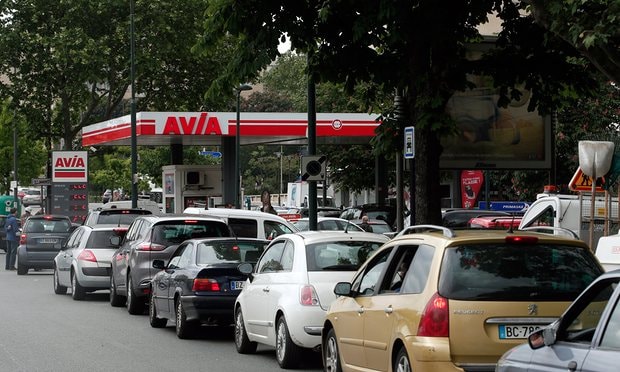France in turmoil
(Baonghean) - The French government's plan to pass employment laws similar to those in Britain has inadvertently thrown the country into a mess of strikes.
 |
| Tens of thousands of people protested across France against the labor bill. Photo: AFP. |
Protesters
Police estimate 18,000-19,000 people took to the streets of Paris to protest against labor reforms.
However, trade unions claimed the figure was as high as 100,000. Marches took place in towns and cities across France, from Toulouse, Bordeaux to Nantes.
The workers' strike resulted in disruptions to oil refineries and nuclear power plants, air and rail traffic, and almost all of the country's major newspapers were unable to print or distribute during the strike.
Union activists blocked roads and bridges in northern France, involving some train drivers and air traffic controllers.
Such a situation puts France in a difficult position, especially when there are only 2 weeks left before the country welcomes about 2 million tourists to watch Euro 2016. Pressure is increasing as the government has to race against time to find a way to end the controversy and find a way to calm the situation.
Reforms to draw closer to Britain
The reforms that plunged France into strike turmoil last week aim to simplify and loosen labor laws, essentially giving private companies more leeway to weigh decisions on hiring, termination, wages and working hours on the basis of economic conditions, rather than being limited to general procedures.
The government led by Prime Minister Manuel Valls believes reforms that are supposed to bring France's labor model closer to those widely used in Germany and Britain will help lower the long-standing unemployment rate of 10% and jump-start a sluggish and stagnant economy that shows no signs of recovery.
However, the Prime Minister's plan is not easy to realize, when the progress is insignificant. The process of getting closer to the UK - a country in the top 3 of the Organization for Economic Cooperation and Development (OECD) in terms of flexibility in the labor market and praised by free-market economists for providing almost no protection for employment and recruitment - is currently taking place very slowly in France.
The road ahead to “reach the dream” is still long for France, they need to climb another 50 places to catch up with England's current ranking.
 |
| Long lines of cars waiting to buy fuel in Paris. Photo: AP. |
A key measure in France's reform package allows large companies with union representation that are facing economic difficulties or seeking to increase market share to bypass industry-wide or sector-wide agreements and negotiate company-specific agreements with workers on overtime (currently capped at 35 hours a week) and reduced hourly pay.
If the company and the staff cannot come to a new agreement, the staff must accept the final decisions reached through a vote with the unanimous consent of unions representing at least 30% of the workforce.
Another important reform specifies when employers are allowed to consider reduced economic productivity as a legitimate reason to fire workers.
Companies with 10 or fewer employees can lay off staff after a one-month drop in revenue, while companies with no more than 300 employees must prove that revenue has fallen for three consecutive quarters to be allowed to make the same decision.
And of course, for larger companies, the above period is longer, sometimes up to 1 year.
Will France be successful in solving the problem?
The reforms, passed this month in a forced move without parliamentary approval, apparently met with fierce opposition from the hard-line French labor union (CGT).
The group sees the reforms as an attempt to reduce the power of labor unions and sectoral labor agreements. Students and other protesters from the left – including some from the Socialist Party – see the reforms as an unacceptable pro-business move.
Initially, the reforms were still defended and supported by many economists and businesses, but now in general, major employers' associations have expressed opposition, as the government has been forced to find a softer way to express its reform plans in order to win public sympathy.
 |
| French police arrest a protester in Paris. Photo: AFP. |
Production and services across France are expected to slow significantly next week. Trade unions are calling for further protests, and are planning strikes in the Paris metro from the opening day of the first Euro 2016 match on June 10.
Instead of remaining steadfast, refusing to roll back unpopular reforms, perhaps the French government needs to find an effective way out.
Perhaps they should learn from the most competitive countries in the World Economic Forum's rankings, Sweden, Norway and Finland, which also have many similarities in labor regulations with France, to attract more foreign investment and create more jobs, instead of focusing on "attacking" workers' rights.
Phu Binh
(According to the Guardian)

